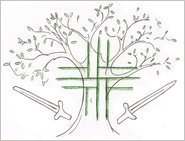I usually use Bible software for Strong's. But now I am moving towards hard-copies and already have some good Bibles.
What I need is an interlinear or a Bible with the Strong's numbers and a Strong's concordance
...Is that how most people use Strong's?, can anyone recommend a good interlinear or a Bible with the Strong's numbers in the text...
This Forum is now inactive and has been replaced by a new Christogenea Forum. You may browse here but there are no updated threads or new posts since January 1st 2017. Forum members please see THIS NOTICE for information concerning your account at the new forum.
using a Bible dictionary
7 posts
• Page 1 of 1
using a Bible dictionary
...and a flaming sword which turned every way, to keep the way of the tree of life.
-

Joe - Posts: 1664
- Joined: Thu Aug 29, 2013 1:23 pm
Re: using a Bible dictionary
My Strong's hard copy has the words alphabetized in the front with the corresponding numbers for the lexicons in the back. It's a thick book. You don't need a "Strongs ready" bible if you have a Strong's. I also have a NAS Concordance which has the Strong's reference numbers.
"If God is a Jew then the only thing left for us to do is commit suicide"
-Dr. Wesley A. Swift
Historical Recordings of interest to Christians;
http://historicalrecordings.net/
-Dr. Wesley A. Swift
Historical Recordings of interest to Christians;
http://historicalrecordings.net/
-

Staropramen - Posts: 2026
- Joined: Sat Jul 14, 2012 12:58 pm
Re: using a Bible dictionary
Thanks Staropramen, I will have to consider a Strongs soon. It is good to know that you don't need a strong's ready Bible.
I will probably get one with the Greek and Hebrew, so that I can use it with the Septuagint translations too.
I see that it may be worthwhile getting an NAS concordance as well, as that does seem to have the Greek and Hebrew.
I will probably get one with the Greek and Hebrew, so that I can use it with the Septuagint translations too.
I see that it may be worthwhile getting an NAS concordance as well, as that does seem to have the Greek and Hebrew.
...and a flaming sword which turned every way, to keep the way of the tree of life.
-

Joe - Posts: 1664
- Joined: Thu Aug 29, 2013 1:23 pm
Re: using a Bible dictionary
Strong's Concordance is a handy tool, and it is okay for quick reference. I use it often for that reason. It will meet many of the needs of the Bible reader who wants to understand something of the Greek and Hebrew underlying the translation.
But it is not comprehensive enough for translating anything. It never intended to show things such as grammar, the parts of speech of the words in its lexicon. It's dictionaries are very concise and sometimes inaccurate. So while a good concordance is an excellent assistant in Bible Study, it also has its limitations.
All Bible dictionaries suck. They are all limited to the understanding of churchmen. Even Strong's has many faults in this area. Thayer is much more comprehensive a lexicon, is excellent in many respects, but also has many faults in this area. They all have definitions for certain words which are religious, based on church doctrine, rather than being based on ancient Greek usage.
Even an excellent secular lexicon such as Liddell & Scott has church definitions, especially for words which are obscure or even unknown outside of the Bible, and there are a few of those. Example: huiothesia.
I reject the church definitions of nearly all Greek words where they cling to their own peculiar meanings. But the only way that one may do so is to see how the Greeks themselves actually used these words in their other writings before the New Testament was written, and one cannot do that thoroughly with a Bible dictionary.
Aside from all of this, Strong's will not work well with a Septuagint. The Septuagint vocabulary set is much larger than that of the New Testament. There are not quite 6,000 different Greek words in the New Testament, while there are probably close to 11 or 12 thousand found in the Septuagint. Strong's was never intended to give definitions for those.
I use a Hatch & Redpath concordance to the Septuagint. I had it throughout nearly all of my studies in prison and along with a Liddell & Scott lexicon it was instrumental. These resources helped me understand the usage of a few words when I was not satisfied with the definitions in the Lexicon, or needed help with the grammar.
I never had a good Greek grammar book. But that was a help more than a hindrance. In my opinion, Greek "New Testament" grammars are engineered to lead students to repeat the mistakes of the usual translations.
http://www.barnesandnoble.com/listing/2671863436442?r=1&kpid=2671863436442&cm_mmc=GooglePLA-_-Book_45Up-_-Q000000633-_-2671863436442
I only had access to the smaller Intermediate Liddell & Scott lexicon for most of my time studying and translating. It is still rather complete, and together with Thayer it is sufficient.
http://www.christianbook.com/intermediate-lexiconl-seventh-edition-liddell-english/9780199102068/pd/02066?event=CF
Now, many of the basic definitions from Liddell & Scott are available online at the Perseus Project.
Later, I was able to obtain the large 9th edition of Liddell & Scott.
http://www.christianbook.com/english-lexicon-revised-supplement-revised-edition/9780198642268/pd/42148?dv=c&en
I still use all of these books preparing my Bible studies. Just not as often, as I have a copy of Bible Works software which helps me do mundane tasks much more quickly.
But it is not comprehensive enough for translating anything. It never intended to show things such as grammar, the parts of speech of the words in its lexicon. It's dictionaries are very concise and sometimes inaccurate. So while a good concordance is an excellent assistant in Bible Study, it also has its limitations.
All Bible dictionaries suck. They are all limited to the understanding of churchmen. Even Strong's has many faults in this area. Thayer is much more comprehensive a lexicon, is excellent in many respects, but also has many faults in this area. They all have definitions for certain words which are religious, based on church doctrine, rather than being based on ancient Greek usage.
Even an excellent secular lexicon such as Liddell & Scott has church definitions, especially for words which are obscure or even unknown outside of the Bible, and there are a few of those. Example: huiothesia.
I reject the church definitions of nearly all Greek words where they cling to their own peculiar meanings. But the only way that one may do so is to see how the Greeks themselves actually used these words in their other writings before the New Testament was written, and one cannot do that thoroughly with a Bible dictionary.
Aside from all of this, Strong's will not work well with a Septuagint. The Septuagint vocabulary set is much larger than that of the New Testament. There are not quite 6,000 different Greek words in the New Testament, while there are probably close to 11 or 12 thousand found in the Septuagint. Strong's was never intended to give definitions for those.
I use a Hatch & Redpath concordance to the Septuagint. I had it throughout nearly all of my studies in prison and along with a Liddell & Scott lexicon it was instrumental. These resources helped me understand the usage of a few words when I was not satisfied with the definitions in the Lexicon, or needed help with the grammar.
I never had a good Greek grammar book. But that was a help more than a hindrance. In my opinion, Greek "New Testament" grammars are engineered to lead students to repeat the mistakes of the usual translations.
http://www.barnesandnoble.com/listing/2671863436442?r=1&kpid=2671863436442&cm_mmc=GooglePLA-_-Book_45Up-_-Q000000633-_-2671863436442
I only had access to the smaller Intermediate Liddell & Scott lexicon for most of my time studying and translating. It is still rather complete, and together with Thayer it is sufficient.
http://www.christianbook.com/intermediate-lexiconl-seventh-edition-liddell-english/9780199102068/pd/02066?event=CF
Now, many of the basic definitions from Liddell & Scott are available online at the Perseus Project.
Later, I was able to obtain the large 9th edition of Liddell & Scott.
http://www.christianbook.com/english-lexicon-revised-supplement-revised-edition/9780198642268/pd/42148?dv=c&en
I still use all of these books preparing my Bible studies. Just not as often, as I have a copy of Bible Works software which helps me do mundane tasks much more quickly.
-

wmfinck - Site Admin
- Posts: 2775
- Joined: Fri Jul 03, 2009 2:09 am
Re: using a Bible dictionary
wmfinck wrote:All Bible dictionaries suck. They are all limited to the understanding of churchmen. Even Strong's has many faults in this area. Thayer is much more comprehensive a lexicon, is excellent in many respects, but also has many faults in this area. They all have definitions for certain words which are religious, based on church doctrine, rather than being based on ancient Greek usage.
Even an excellent secular lexicon such as Liddell & Scott has church definitions, especially for words which are obscure or even unknown outside of the Bible, and there are a few of those. Example: huiothesia.
I reject the church definitions of nearly all Greek words where they cling to their own peculiar meanings. But the only way that one may do so is to see how the Greeks themselves actually used these words in their other writings before the New Testament was written, and one cannot do that thoroughly with a Bible dictionary.
Bill, has anyone prior to yourself examined at any great length ancient Greek usage of words and how they compare to definitions influenced by church doctrine?
"If God is a Jew then the only thing left for us to do is commit suicide"
-Dr. Wesley A. Swift
Historical Recordings of interest to Christians;
http://historicalrecordings.net/
-Dr. Wesley A. Swift
Historical Recordings of interest to Christians;
http://historicalrecordings.net/
-

Staropramen - Posts: 2026
- Joined: Sat Jul 14, 2012 12:58 pm
Re: using a Bible dictionary
Staropramen wrote:Bill, has anyone prior to yourself examined at any great length ancient Greek usage of words and how they compare to definitions influenced by church doctrine?
Wow, sorry, after all this time I just saw this question...
How many people who have studied Greek sufficiently and have also had the appropriate perspective by which to challenge the academics in the seminaries, who have been shiksas for satan?
Arthur Lee had said that when he was in Bible School, in a school where they actually studied the Greek of the NT for more than just a semester, he saw things that raised questions, and his questions went unanswered. That is one thing which eventually sent him down the path to CI.
-

wmfinck - Site Admin
- Posts: 2775
- Joined: Fri Jul 03, 2009 2:09 am
Re: using a Bible dictionary
wmfinck wrote:Staropramen wrote:Bill, has anyone prior to yourself examined at any great length ancient Greek usage of words and how they compare to definitions influenced by church doctrine?
Wow, sorry, after all this time I just saw this question...
How many people who have studied Greek sufficiently and have also had the appropriate perspective by which to challenge the academics in the seminaries, who have been shiksas for satan?
Arthur Lee had said that when he was in Bible School, in a school where they actually studied the Greek of the NT for more than just a semester, he saw things that raised questions, and his questions went unanswered. That is one thing which eventually sent him down the path to CI.
Actually I asked you this question once on TS. So you did answer it!
"If God is a Jew then the only thing left for us to do is commit suicide"
-Dr. Wesley A. Swift
Historical Recordings of interest to Christians;
http://historicalrecordings.net/
-Dr. Wesley A. Swift
Historical Recordings of interest to Christians;
http://historicalrecordings.net/
-

Staropramen - Posts: 2026
- Joined: Sat Jul 14, 2012 12:58 pm
7 posts
• Page 1 of 1
Return to Bibles and Biblical Apocrypha
Who is online
Users browsing this forum: No registered users and 0 guests

